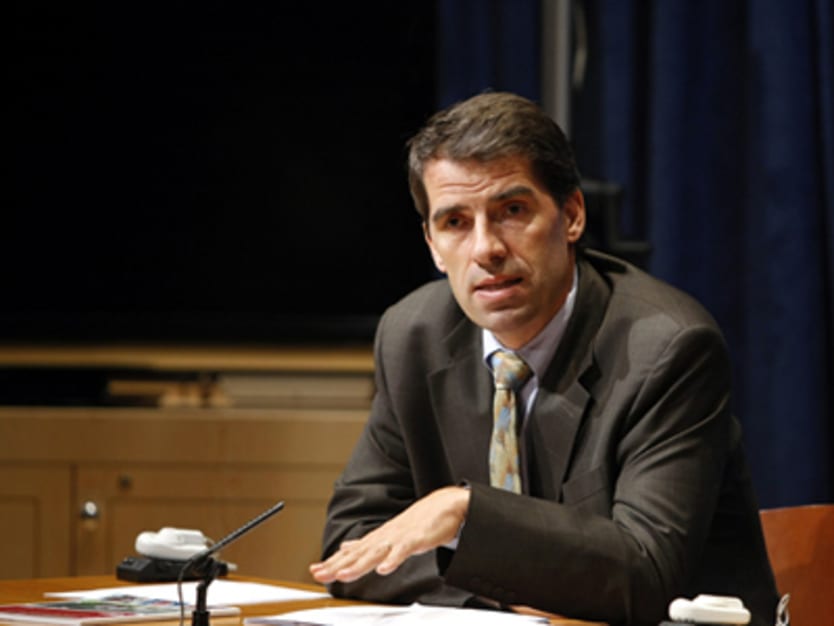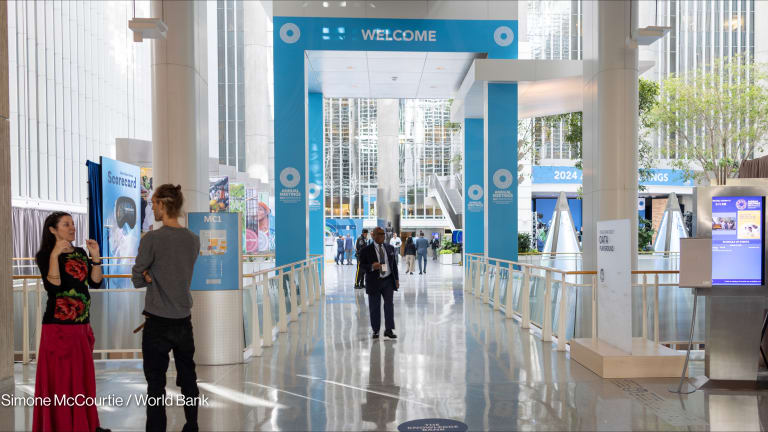
The international community must increase aid and pursue a development-oriented multilateral trade agreement to accelerate progress on the Millennium Development Goals, according to a recent report co-authored by the U.N. Development Program.
United Nations Secretary-General Ban Ki-moon called the results of the analysis by the MDG Gap Task Force “mixed” and called for the international community to prove it is serious on a global partnership for development by directing resources to where they are most needed.
But there’s more to the report than meets the eye, according to Olav Kjørven, assistant secretary-general and director of development policy at UNDP. In an exclusive interview, he shared his views on the report and the challenges faced by the international development community in the race to meet the MDGs before the 2015 deadline.
Here are some excerpts of our wide-ranging conversation with Kjørven:
With the report showing mixed results on official development assistance, stagnation on debt, trade, medicines and technologies, would you say that the global compact is eroding or just in need of re-focusing?
As we noted when we launched the report, this is the second year in a row with declining ODA. We’ve also had many years of very limited progress on trade and debt relief. We’ve achieved a lot, but there’s still countries out there with debt problems and those that are sliding back into debt problems again. But still, a lot has been accomplished so it’s almost natural that one could run out of steam a little bit in that area.
There’s also limited progress on technologies and medicines, but in the area of ICTs — and particularly mobile phones — things have gone much faster in terms of penetration than anyone had thought possible a few years ago. That’s not because of the partnership as such, but instead a range of other factors … I do think there’s less “oomph” in the global partnership for development at this point than we would like to see, however, and its worrisome if this continues.
It’s paradoxical given that it’s happening against the backdrop of two other phenomena that go in the opposite direction: One is that when you visit developing countries around the world there is tremendous focus on the MDGs and the commitment to make as much progress as possible across the other 7 MDGs is tangible — you can touch and feel it. A lot of progress is being made [and] there’s an awful lot of excellent work going on that is getting results. The other contrast to observe is the enormous enthusiasm and engagement both north and south around the post-2015 development agenda. So what we worry about is that if the global partnership for development, which underpins all our efforts to make progress on these 7 other goals, erodes then conditions would worsen in terms of our ability to agree on an ambitious second global compact around development.
Can the situation be turned around?
For the last two years towards 2015, we’re certainly hoping that donor countries will renew their commitments around ODA and stop the decline both in total figures and the share that goes to least developed countries … We also certainly hope that there’ll be renewed energy around trade. And although it’s difficult to imagine any breakthrough when it comes to the Doha Round, there are still steps that could be taken that could improve access to global markets for developing countries and least developed countries in particular. We also hope to see renewed commitment when it comes to the issue of medicines.
Is there a risk that some of the MDGs will be deemed unreachable by the 2015 deadline and that governments might then prematurely turn their attentions to the new development framework, without having first redoubled efforts to scale up the ongoing work?
What we see today is that a significant number of developing countries are redoubling efforts to make progress on the most lagging MDGs in their particular context. That is something that seems to have momentum. Of course it would help tremendously if developed countries would really prioritize support for that, which means stopping the slide in ODA … and making sure that least developed countries get their fair share of resources. … If that were to happen then I’m quite optimistic that the post-2015 agenda will not undermine any efforts, because there’s a strong consensus that [it] should incorporate the themes of the MDGs and make sure that the unfinished business is addressed, while adding critical issues that were not part of the MDG framework. So I don’t think that one should worry about the post-2015 agenda — quite the contrary, I think [it] is needed to re-energize the global partnership for development for the next 15 years.
But how likely is it that ODA targets will get back on track in a time of continued austerity?
I don’t know how likely or unlikely it is. If we all lean back and observe it happening, then it will continue to happen. But if enough of us voice concern — serious concern — about what is happening and what it could mean for our future efforts to eradicate poverty and solve some of the most intractable challenges we’re facing … I think we have a chance of again creating the kind of groundswell of support for development that is needed to maintain political commitments.
We’ve seen this before, of course. And yes, times are tough in many countries in Europe, but we also see some countries — despite tough times — being able to continue to meet their commitments or move forwards towards them.
And regarding debt sustainability, how do we make sure that countries at high risk of falling back into debt do not do so?
There is a risk and we need to remain vigilant both in terms of providing the kind of capacity development that is needed for countries that are vulnerable to manage their balance and ensure that the mechanisms kick in when they’re needed. There is also the issue of reforming the architecture for debt work-outs, but very little progress has been made and the ability to adequately resolve sovereign debt is actually a threat to global stability. So we argue that there is a need to establish a global mechanism for early and comprehensive resolution of debt crises. We need three things: one is to ensure that those critically indebted countries that need that relief can continue to have access to it; secondly, to develop and disseminate techniques for effective debt management and take into account the social dimension, not only the hard macroeconomic aspects; and thirdly, that we need an international working group to develop options for improving the international architecture.
Another recommendation in the report was to encourage pharmaceutical companies to make essential medicines more affordable and to develop much needed new medicines. But will price reductions lead to a loss of innovation in tackling some of the world’s most serious and/or forgotten diseases?
In order to solve an intractable, major challenge that has life and death implications for large numbers of people — access to affordable, essential medicines — one needs to apply the full toolkit and ensure that subsidies are available to bring prices down, in combination with the kinds of contributions that the industry itself needs to make. That’s the essence of the partnership. There’s a lot to be said for the enormous gains that have been made by applying that mentality.
But there’s another dimension to this: It’s true that in a business as usual context, one could risk hurting innovation by reducing the profit margins of the companies, their abilities to protect patents and so on. But what we’re increasingly seeing over the last few years is a radically different approach to innovation, to designing new products, to taking new products to market — and it’s increasingly happening in a much more open and collaborative way. Actors one would previously have thought of as competitors are now taking the opportunities to get the innovation designed and to market more quickly with a more collaborative and open approach.
I think we’re scratching the surface here of something that has become extremely important — to find real alignment between public policy and what companies are trying to do, namely making money in these markets. So I know that this isn’t the panacea for getting affordable medicines to the masses, but I think it’s a very interesting new development that could have far-reaching consequences.
And will the same be true for public-private partnerships in areas such as access to technologies?
Yes, exactly, I think that what is really very exciting is when you take these new friends in business and think about what this could mean for the post-2015 development agenda; in terms of the technologies that could help us move decisively towards a low-carbon environment and a sustainable future and [those] that could help us improve food security. I think the promise of the post-2015 agenda is not simply to say what people learned from the MDGs in terms of what worked and what didn’t. Knowing what goals to take forward and what goals to add is important, but it’s a very mechanistic approach to the whole thing that misses possibly some of the biggest opportunities that we have to forge a global partnership for the future to achieve sustainable development and eradicate poverty.
In terms of the environmental challenges to be faced in a future framework, will a set of Sustainable Development Goals be integrated into one track, in a joined-up approach with other targets and goals?
Well, of course the U.N. membership will decide on this but I’m quite optimistic, given that at this point the convergence of the SDG track and the post-MDG agenda is already happening at the conceptual level. When it comes to the substantive discussions, when you listen to what’s been happening in the Open Working Group, or the discussions of the High-Level Panel, or the global consultations on the post-2015 agenda, people are talking about exactly the same things everywhere. I think there’s such an overwhelming sense of realization that we need to tackle poverty and that we need to do that in a way that’s sustainable.
These issues belong together and I think that this is something that is now reflected in the outcome document that has been negotiated for the special event on Wednesday … it says quite clearly that there’s a call for a single agenda, a universal agenda that commits us to eradicating poverty and achieving sustainable development. So it becomes a bit mechanistic [to find out] exactly when and how this will happen … the way it’s currently envisaged is that we now have an awful lot of fantastic material on the table from the global consultations that we’ve been spearheading and facilitating, which will inform and provide a lot of input to discussions that will take place over the next year. …
It’s a bit of a relay here. We’ve had the HLP, we’ve had all these other processes that were all interlinked and the baton in a sense now goes to the Open Working Group and expert group on financing, before going back to the [U.N] secretary-general for crafting the proposed framework and then finally back to the governments for inter-governmental negotiations.
Does the fact that there were so many inputs mean that we risk coming up with a framework that is less ambitious than might otherwise have been expected?
There’s always that risk. Inter-governmental negotiations in our day and age are notoriously challenging. It’s difficult for governments to agree on things these days — trade and climate change are striking examples. Therefore it’s not going to be easy to maintain the ambition and arrive at a focused agenda with a limpid set of relevant, aspirational goals. But this is precisely why it’s so great that we now have all these contributions [and] engagements from all these different stakeholders … I mean, 1.4 million people have just weighed in on this about the world they want to live in. So it is precisely by mobilizing this record level of engagement from people all over the world that we have the best chance of inspiring, stimulating, cajoling and pushing governments to agree on the stuff that is very necessary, but also quite difficult.
You can follow Devex on Twitter and Facebook, and find comprehensive coverage of New York #globaldev Week here.
Read more development aid news online, and subscribe to The Development Newswire to receive top international development headlines from the world’s leading donors, news sources and opinion leaders — emailed to you FREE every business day.
See more:








